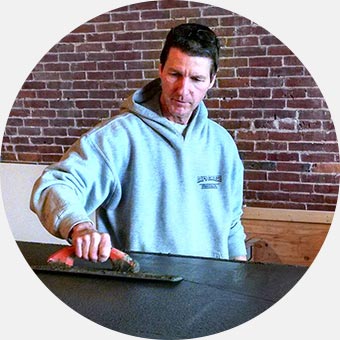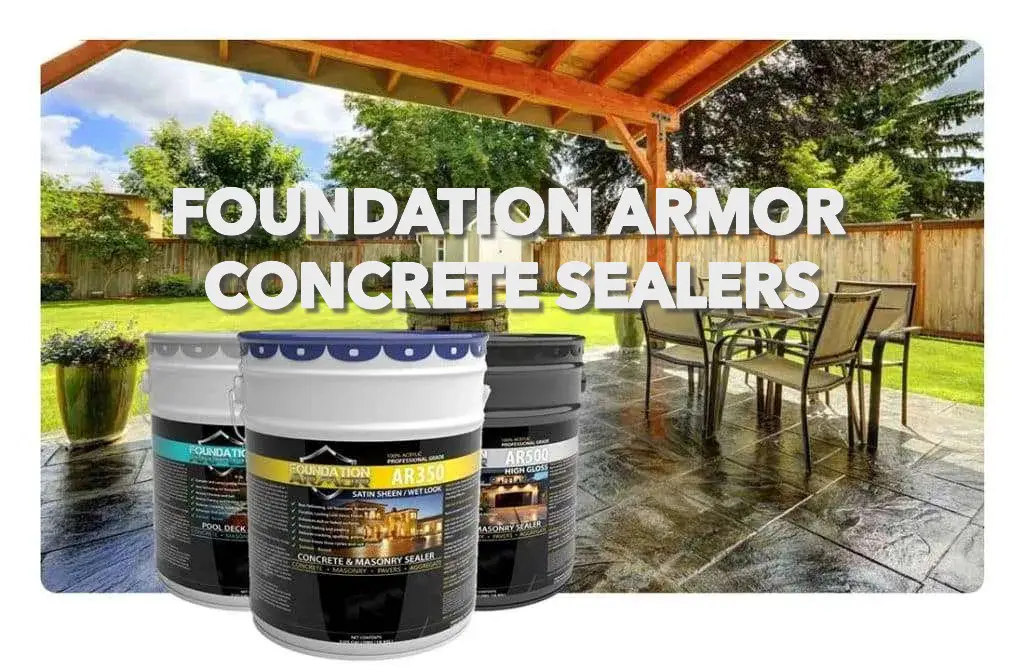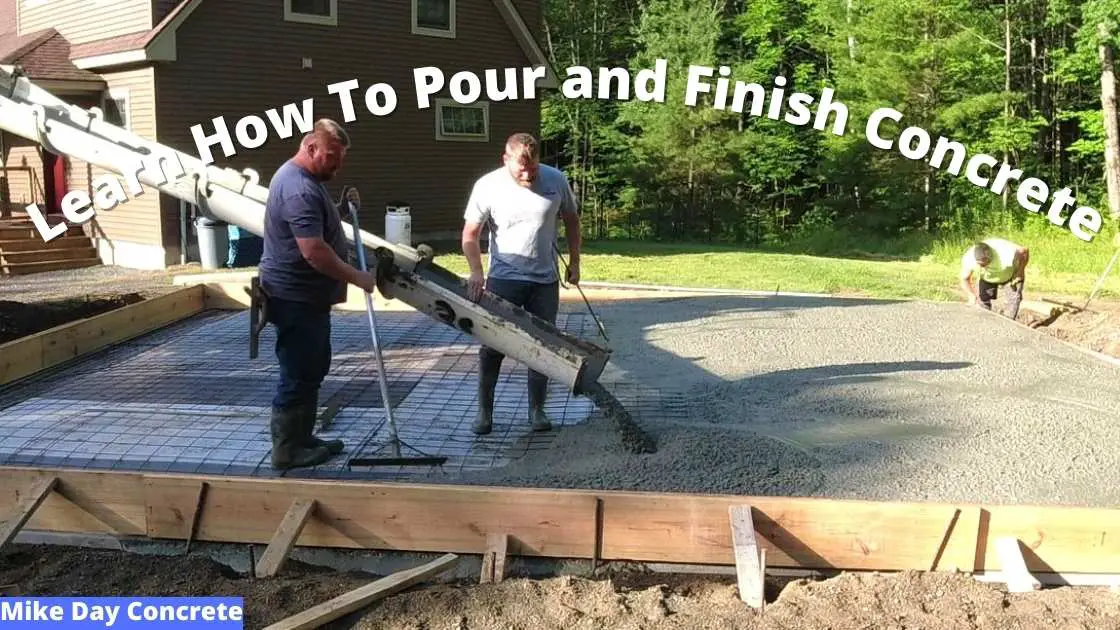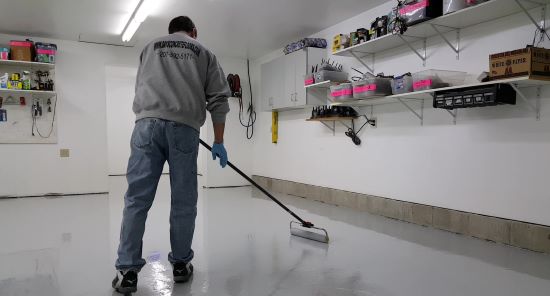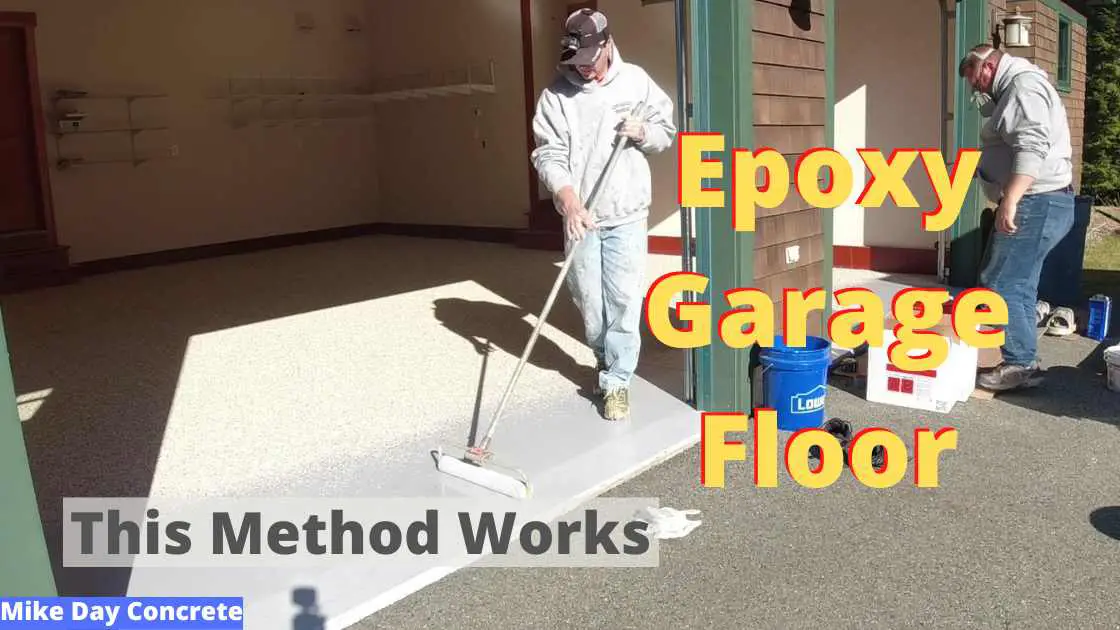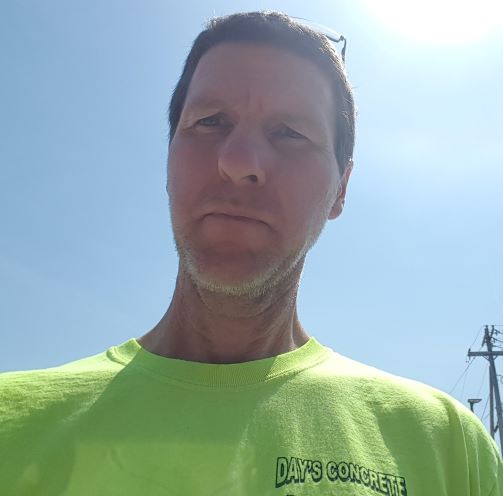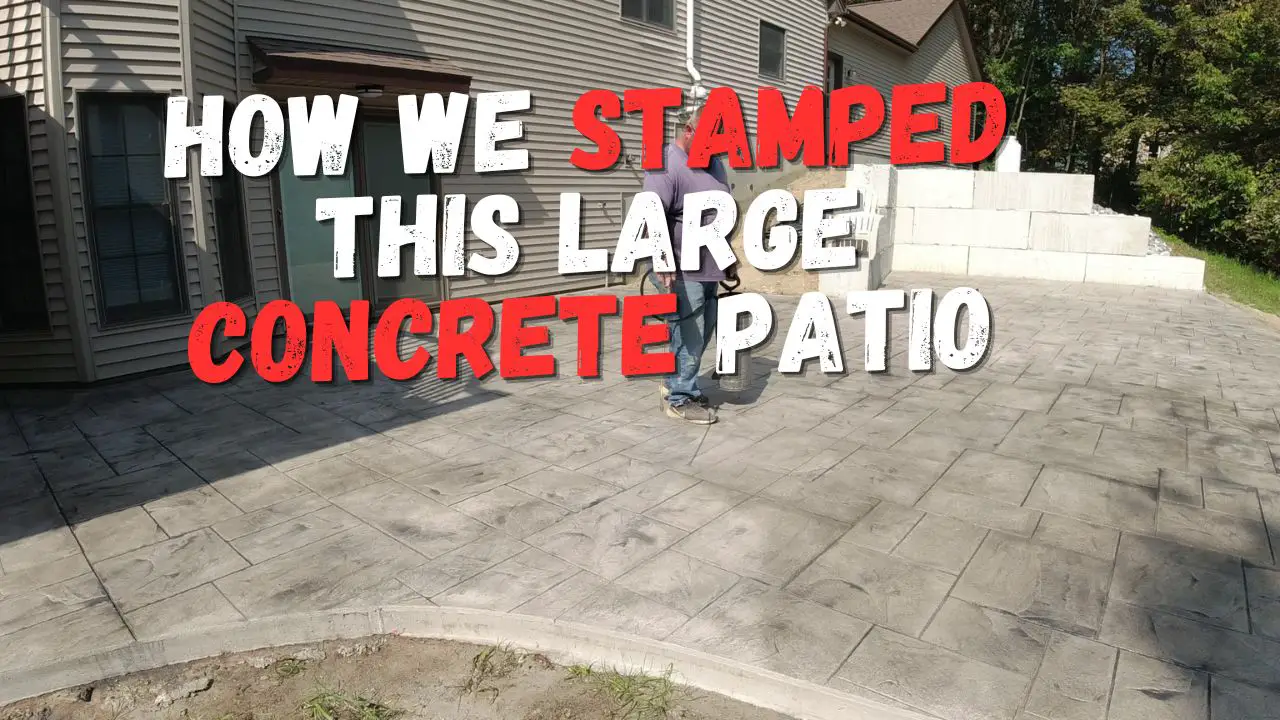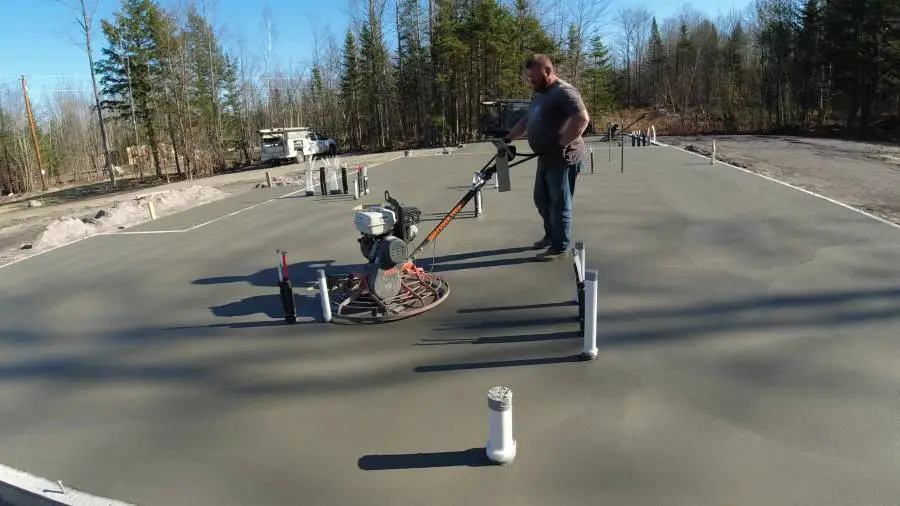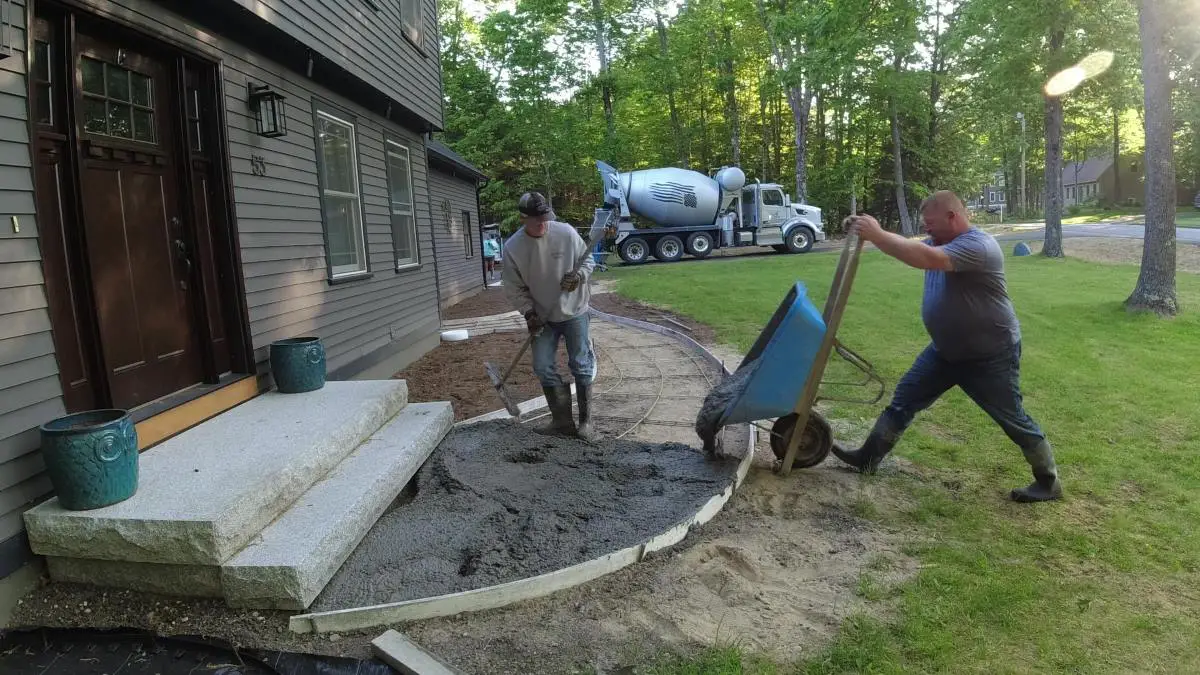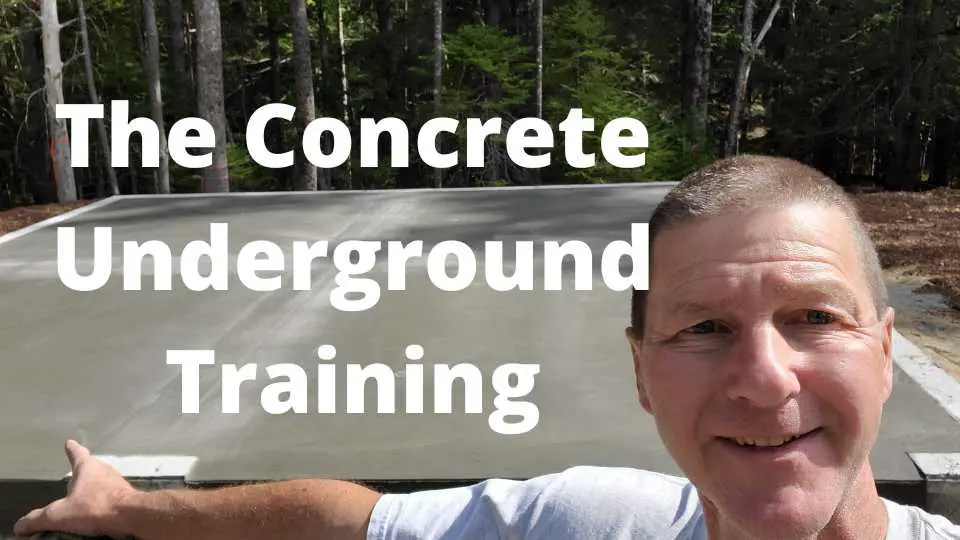How to clean concrete
If you're trying to figure out how to clean your concrete, you've found the right page.
Cleaning concrete isn't an exact science. What I mean is, it depends on the kind of substance you're trying to remove from the concrete.
Is it an organic material like dirt or leaf residue?
Or is it an in-organic material like oil or grease?
Or.... is it dog or cat urine?
All these have different methods if you want to achieve the best results and get your concrete clean again.
Having been in the concrete business for over 30 years, I'll share with you what's worked best for me when I'm cleaning concrete for my customers.
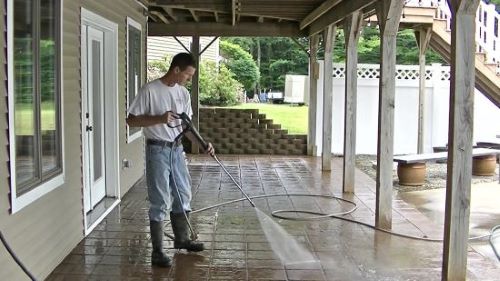
my best method for Cleaning exterior concrete
My best method for cleaning concrete is with a pressure washer. A pressure washer will remove most, if not ALL, of the dirt and mold related issues when it comes to getting your concrete clean again.
This method includes cleaning concrete driveways, concrete patios, pool decks, concrete stairs, stamped concrete, sidewalks, and walkways. It even includes cleaning concrete walls and retaining walls.
If you've got a pool deck that's discolored and dirty, a good pressure washing will remove the dirt, mold, mildew, leaves, and bird droppings, making it look like new again. Same goes for a dirty concrete driveway.
Having the right pressure washer and cleaning accessories will make the job even easier.
What tools you'll need to help clean your concrete
cleaning small areas or tiny spots on concrete
If all you have is a small area to clean or just a few spots then you probably don't need a pressure washer.
I use both a stiff bristle scrub brush and a drill brush. Both these brushes along with a cleaning agent are great for small areas.
Just rinse the area with a garden hose, mix some cleaning agent in a bucket and apply it to the dirty concrete.
Scrub the area with the scrub brush or the drill brush and rinse again. Repeat as many times as you need to. Your concrete will be cleaner.
If the area is just not getting as clean as you like with soap and water, check out some of my other suggestions below.
These are my TOP 11 TIPS for pressure washing concrete!
Some cleaning detergents that work on concrete
If after, or during pressure washing you don't think the concrete is getting as clean as you like, then try some Dawn dish detergent or Simple Green.
Either one of these usually does the job for me.
Mix a two tablespoons in a 5 gallon bucket of water and scrub the dampened concrete.
Soaps like these even work good to remove lightly stained areas from oil and grease. The soap will re-emulsify the oil and then you can remove it by rinsing it away.
Once you're done scrubbing, pressure wash the area again and rinse off any soapy residue. This method has worked the best for us in most cases.
Natural remedies you can try for cleaning concrete
I've used vinegar and water to clean concrete. Mix 1 part vinegar to 1 part water for a fairly strong cleaning solution.
I've also used lemon juice and water. You can either buy lemon juice and mix 16 oz per gallon or you can just squeeze some lemons into a glass of water for small areas to concrete to clean.
I've also used baking soda, 1/2 cup to 1 gallon of water is a good mixture to try at first.
You can also mix 2 Cups of baking soda with 1 Cup of Bleach in a gallon of water for a stronger solution.
Pour this on your concrete and scrub it into the surface. It will remove dirt, grime, mold, mildew and some staining.
All these cleaning solutions have worked for me at one time or another on various types of concrete.
Just be aware that vinegar and lemon juice are acidic, you don't want to use too strong of a solution or it could etch the concrete.
This mostly applies to polished concrete, concrete countertops, or stained concrete.
If you don't want to mix your own solution at home, there is a good vinegar based cleaner as an alternative that's already mixed with water.
NOTE: Always try cleaning in an inconspicuous area first if you can. See how the cleaning solution will react with your concrete before you try it in a large area.
Safe, stronger cleaners that work good on concrete
After you've tried the milder cleaning agents and your concrete still isn't clean, you can try something stronger.
I've had very good results using a cleaner/etcher that's 100% biodegradable, safe, organic acid, that won't burn your skin and doesn't have any fumes.
#1. One of these concrete cleaners is Eco-Etch Pro. This cleaner deeply cleans your concrete and won't harm your grass, flowers, or shrubs.
For a powerful cleaner, this is what you need. It'll also clean brick pavers, cement blocks, and natural stone.
#2. RadonSeal Efflorescence cleaner for concrete and brick pavers. This concrete cleaner works very good for cleaning the white powdery substance you see on a lot of concrete floors, concrete walls, block walls and brick pavers.
Spray this cleaner on and let it sit for a few minutes, you'll see it bubble up and fizz as it's cleaning. Scrub it in a little, then rinse it off.
I use this for cleaning garage floors, basement floors, basement walls and block walls all the time. It's the best cleaner for the white powdery stuff.
Neutral PH Cleaners for concrete
What are neutral ph cleaners and why do I need to know about them?
A neutral ph cleaner means it's neither acidic (like vinegar) or highly alkaline.
It's PH is right around a 7, which is neutral. When you clean concrete, especially decorative, colored, stained, or polished concrete, you are safer to use a neutral ph cleaner.
An acidic or alkaline cleaner could etch, and/or discolor your concrete which would really disappoint you.
I recommend, on any type of decorative concrete, to use a neutral ph cleaner.
Here are a couple you can try:
Neutral PH concrete floor cleaners are better suited and mostly used to clean finished concrete floors that are either polished or have a sealer on them.
This type of cleaner is also very good for cleaning epoxy coatings on concrete floors.
best methods for Cleaning Interior Concrete Surfaces
For cleaning sealed or polished concrete floors, your best bet is to use a neutral PH cleaner like the one's above.
You can also use Dawn or Simple Green, although they might leave streaks if you don't rinse all the residue off.
If you haven't tried a STEAM CLEANER on your finished concrete floors, I highly recommend cleaning them with this.
The steam is non-toxic, pet friendly, streak-free, and cleans off all kinds of dirt, crud, and goo on the floor. Best of all it cleans quickly.
If washing and rinsing with a pressure washer, or hose will make too much of a mess, try the steam cleaner.
Or... try the Microfiber Spin Mop. This mop is excellent for cleaning concrete floors. You can use it wet or dry (for dusting).
You can control the amount of water that's used for cleaning, making this mop much faster and more efficient than regular mops.
For a garage floor or an unfinished basement floor that has a floor drain, the pressure washer with the surface cleaner attachment would work good.
Most any of the cleaners mentioned above would be good for a garage floor or a regular basement concrete floor.
Just be prepared to squeegee the excess water out the door or into the drain.
Pet Friendly Concrete Cleaners
If you've got pets and are worried about using some of these cleaners to clean your concrete, there are some very good ones that are pet friendly.
The Sheiner's Neutral PH cleaner is pet friendly.
Dawn and Simple Green are very mild detergents, especially when diluted with water.
GP66 Green Miracle Cleaner is a concentrated all-purpose cleaner that's biodegradable and environmentally friendly. This will clean your concrete very good and not harm your pets.
ECO-Orange super concentrate is an all natural, plant based, non-toxic, biodegradable, all purpose cleaner that's PET FRIENDLY AND PET SAFE to use on all kinds of concrete surfaces.
If you have pets, or if you're just an animal lover (like me) and don't want to chance harming the environment or any animals then I suggest using these concrete cleaners.
Can I use muriatic acid to clean my concrete?
Yes you can, but cleaning concrete with muriatic acid has to be done with the upmost care.
It's toxic, caustic, and will burn your skin, lungs, and the inside of your nose if you breathe the fumes.
It's really a last resort kind of concrete cleaner for most people.
If you do decide to use it, make sure you wear the proper gloves, boots, clothes and mask to protect yourself.
How much you dilute it with water is also important. Whenever I've used it to clean concrete, I always dilute it around 9 parts water to 1 part acid.
I use an acid safe pump up sprayer to apply it, let it sit on the concrete for a few seconds, then scrub it with an acid safe scrub brush.
You can also apply it to the concrete with a plastic mop or dump it out of the bucket and scrub brush it around.
Make sure you don't use anything metal. The acid will react with any metal surfaces it comes into contact with.
Then I neutralize the acid/water solution with a mixture of baking soda and water. I usually use 1 Cup of baking soda in 2.5 gallons of water.
(You could also use ammonia/water to neutralize the acid - 1 part ammonia to 9 parts water) But I don't like breathing ammonia either.
I mop or spray the baking soda/water solution on the acid & water solution, then I rinse it with water 3 - 4 times to make sure I removed all the residue.
If I'm in an enclosed area or inside a building, I have to use a wet vac to clean up all the rinse water.
Muriatic acid does work good for cleaning concrete (if you know how to use it safely). There's just too many other good concrete cleaners out there to have to use this stuff.
Is Tri-Sodium Phosphate TSP ok to use for cleaning concrete?
Tri-Sodium Phosphate, or TSP, is a very good, heavy duty, concrete cleaner. It's great for removing grease, oil, and stubborn dirt stains.
You can combine it with household bleach to remove stubborn mold and mildew on your concrete.
It's sometimes used to remove old paint from concrete. It's not know for damaging regular concrete but I wouldn't use it on colored, stained, or decorative concrete finishes.
It is toxic though, and it's not pet or environmentally friendly. It'll harm your plants or maybe even kill them.
It will also damage metal, ceramic, glass, and painted surfaces.
Again, it's kind of a "last resort" concrete cleaner for small difficult spot cleaning.
It's a good cleaner, just not really safe to get on your skin, breath, or for your pets to come in contact with.
If you decide to try this cleaner just be really careful, same as with the muriatic acid.
In conclusion:
There's a lot of good concrete cleaners listed on this page. Most of them I've used in my business cleaning my customers concrete driveways, patios, floors, and pool decks.
I try to use the least harmful concrete cleaners whenever possible and still get the concrete really clean.
I've given you a lot of good choices and examples for when to use them.
Below, you'll find some more specific concrete cleaning solutions for common problems associated with removing or cleaning stained or dirty concrete.
Hopefully you find the best product to clean your concrete!
How to remove an oil stain from concrete. This is my best method.
Removing the smell of dog and cat urine from concrete is always a challenge. Here's what I have found works the best.
Trying to remove a rust stain from concrete? This is what I use.
Here's how I remove black glue from concrete.
And, here's how I remove carpet glue from concrete.


